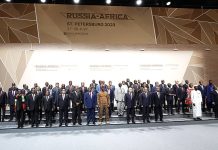The Russia-Africa Summit, a pivotal event that brings together leaders from Russia and the African continent, aims to foster cooperation, strengthen diplomatic ties, and explore new opportunities for mutual growth and development. In this article, we delve into the significance of the summit, the history of Russia-Africa relations, key highlights from the latest summit, and the potential for future collaboration.
A Historical Overview: Russia’s Engagement with Africa
Early Ties and Historical Context
Since the early 20th century, Russia has maintained diplomatic relations with several African nations. The Soviet Union, Russia’s predecessor, played a significant role in supporting African countries during their struggles for independence. During this period, educational and military support were extended to African leaders who sought liberation from colonial rule.
A Shift in Dynamics
The dynamics between Russia and Africa underwent changes with the dissolution of the Soviet Union in 1991. The subsequent years saw a relative decline in engagement. However, in recent times, Russia has been reasserting its interest in Africa, recognizing the vast potential for economic and strategic partnerships.
The Significance of the Russia-Africa Summit
Strengthening Diplomatic Relations
The Russia-Africa Summit provides a platform for African heads of state and Russian leadership to engage in high-level talks. The meetings facilitate direct dialogue and enable the establishment of bilateral agreements that cover areas like trade, investment, defense cooperation, education, and healthcare.
Economic Cooperation and Investment
With Africa being home to numerous emerging markets and untapped resources, the summit seeks to foster economic cooperation and investment between Russia and African nations. By identifying areas of mutual interest and promoting trade relations, both parties stand to benefit from increased economic growth and diversification.
Addressing Regional Security Concerns
Amidst geopolitical challenges and security threats in some African regions, the summit also serves as an opportunity to address these concerns. Russia, with its experience in security affairs, can offer assistance in peacekeeping efforts and support initiatives aimed at stabilizing conflict-ridden areas.
Key Highlights from the Latest Summit
Multi-Faceted Engagements
The latest Russia-Africa Summit witnessed a broad range of engagements, covering various sectors. Leaders discussed infrastructure development, energy partnerships, mining collaborations, agricultural investments, and technology transfer initiatives.
Memorandums of Understanding (MoUs)
To solidify their commitment to collaboration, several African countries and Russia signed MoUs during the summit. These agreements lay the groundwork for future joint projects and endeavors, enhancing the prospects of long-term cooperation.
Humanitarian Cooperation
The summit also underscored the importance of humanitarian cooperation. Russia pledged support for healthcare projects, educational scholarships, and technical training programs in Africa, aligning with the Sustainable Development Goals (SDGs) outlined by the United Nations.
Future Prospects and Opportunities
Energy Sector Collaboration
Africa’s burgeoning energy demands present significant opportunities for Russian energy companies. With Russia being a leading exporter of oil and natural gas, there is potential for substantial energy cooperation and investment in Africa’s energy infrastructure.
Enhancing Agricultural Productivity
Agriculture remains a crucial sector for many African economies. Russia’s expertise in agriculture and modern farming techniques can contribute to enhancing productivity and food security in the region.
Space and Technological Advancements
Russia’s strong capabilities in space exploration and technological advancements can pave the way for collaborations in satellite communications, weather monitoring, and remote sensing applications for agricultural and environmental purposes.
Conclusion
The Russia-Africa Summit serves as a crucial platform for fostering cooperation, strengthening diplomatic ties, and exploring new opportunities for mutual growth and development. As both Russia and Africa recognize the importance of diverse partnerships in today’s interconnected world, the summit has the potential to chart a new course of collaboration that will benefit the people of both regions.
FAQs
- What is the history behind the Russia-Africa Summit?
- The Russia-Africa Summit traces its roots back to the early 20th century when Russia, then known as the Soviet Union, supported African countries in their struggles for independence.
- What are the key objectives of the summit?
- The summit aims to strengthen diplomatic relations, promote economic cooperation and investment, and address regional security concerns.
- What sectors were covered during the latest summit?
- The latest summit covered engagements in infrastructure development, energy, mining, agriculture, and technology transfer.
- How can Russia and Africa benefit from collaboration in the energy sector?
- Russia, being a leading exporter of oil and natural gas, can meet Africa’s energy demands, while Africa offers opportunities for investment and market diversification.
- What are the potential areas of future collaboration between Russia and Africa?
- Future prospects include energy sector cooperation, agricultural productivity enhancement, and joint ventures in space and technological advancements.


































